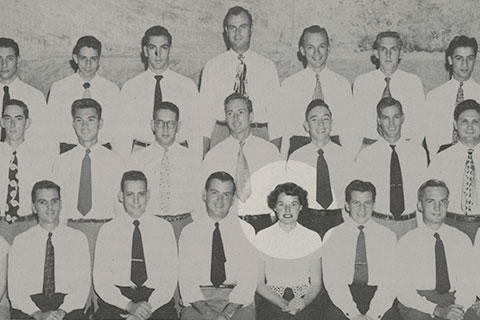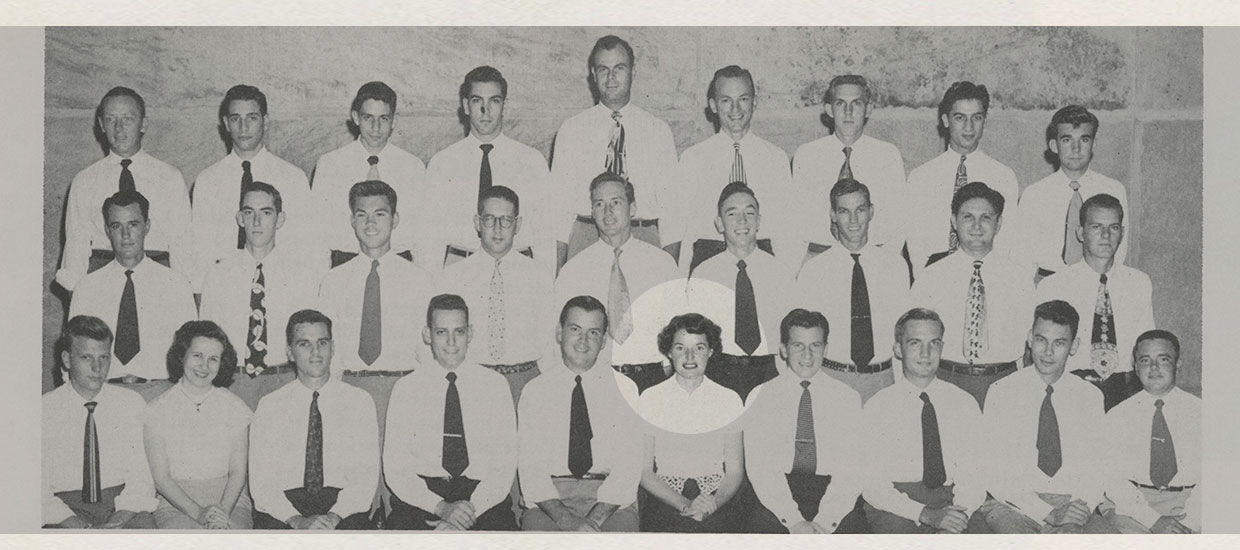Attracting girls and young women to the STEM fields has become a national priority in recent years, and the University of Miami College of Engineering is ahead of the curve: females currently make up 31 percent of the student body, significantly more than the U.S. average of about 20 percent. The College’s students can look to women in leadership positions, including a departmental chair, female faculty members, and women engineers on the University’s Board of Trustees, as role models.
In earlier days, a woman in the male-dominated field of engineering had far less company. After it opened in 1947, the College graduated its first female students—three of them—in 1952. Maria Teresa Giammattei, B.S.C.E. '52, and Margarita C. (Conchita) Giammattei, B.S.E.S. '52, sisters from El Salvador, studied civil engineering, and Conchita went on to become the mayor of Santa Ana in her home country.
The third of these forerunners, Shirley Hoffman Kilkelly, B.S.M.E. '52, originally from Brooklyn, came to UM to study mechanical engineering after completing her military service, and continued on to a varied and exciting career that included work on the lunar module. The only surviving member of the three, she now lives in Sebastian, Florida.
During World War II, Kilkelly was serving as administrative support for a colonel in the Marine Corps offices in Washington, D.C., when a minor uniform infraction involving her stockings led to a demotion. “I was busted from a sergeant down to a PFC (private first class),” she said. Unable to get Kilkelly’s rank restored, the colonel, who recognized her aptitude for mechanical engineering, encouraged her to enroll at a school in Oklahoma to become an aircraft engine mechanic.
Kilkelly's training there led to a job in California, working on aircraft that were sent back for repairs from the fighting overseas. The draft had created a shortage of machinists that opened up opportunities for women, but discrimination persisted. “They would only let us work on dismantling the aircraft. They wouldn’t allow the women to have anything to do with the assembly of aircraft that were going to be shipped out again,” she said.
After the war ended, Kilkelly came to Miami, where her sister lived, for engineering school. Because she came on the GI Bill, she was about 10 years older than most of her fellow students.
“I didn’t have any conflicts or anything with the men,” she said of her UM years. “For one thing, they all knew that I was being graded the same as they were. There were no special allowances.”
After graduating, Kilkelly had difficulty finding suitable work in Miami, where there was not yet general acceptance of women engineers. She accepted a job with Worthington Pumps and moved to New Jersey, where she met her late husband. Following that, she moved into positions of increasing responsibility in aircraft production, including testing of Sikorsky XSH-60J helicopter subsystems.
The job Kilkelly enjoyed most was with the Grumman Aircraft Engineering Corporation (later Grumman Aerospace Corporation), the chief contractor on the Apollo Lunar Module that landed men on the moon. The module comprised many subsystems, and she travelled to their various vendors to observe and test the landing and other equipment, ensuring that it complied with specifications and standards. She was the only woman she knew of at the time who performed this type of work.
Of her pioneering career, Kilkelly said, “I tell my friends about it. They’ve seen all of these posters that I have on the wall of the [Grumman] F-14 [Tomcat] and the Sikorsky helicopter, and they find it incredible that I did those things.”
Kilkelly is encouraged that so many female students are pursuing studies in a field that she described as very rewarding. Her advice to young women who are considering careers in engineering?
“Go for it, girl!”
To make a contribution to the Hugo M. Delgado, Jr., Women in Engineering Endowed Scholarship Fund, or to support the establishment of a new Women in Engineering program initiative, please contact Lisa Merritt at 305-248-1563 or lmerritt@miami.edu.





